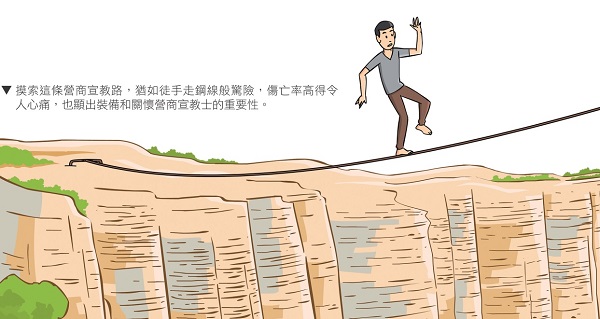There is a long way to go
Business missionary visit to China promotes pioneer Tony
Interview and arrangement/Lin Shilihui

It was a sunny morning, and there was a group chairman in front of me. He did not have the arrogance of a boss, but was gentle, modest and polite. He is Tony—a Christian who has been in the business world for more than thirty years.
Tony, an electronic engineer by training, started his business in the 1980s under the wonderful guidance of God. Today, his companies are spread across China, Hong Kong, Macau, Taiwan, Singapore, South Korea, India, United Arab Emirates, South Africa and Brazil. From the beginning of business, God guided him step by step to become a promoter and cultivator of business missionary, actively helping and caring for business missionaries, setting an example and walking with them on the road of business missionary.
The road to business and faith practice
Sitting in the conference room, Tony Qian said that he was not a business missionary. "I am just a businessman who hopes to bless the local people through business. As a Christian, no matter whether you live, work or do business, you must live out your faith."
Yes, being a Christian on mission is different, and it’s not easy. Since starting his business, Tony has been constantly searching and struggling between doing business and practicing his religious mission, such as how to do business in a country where everyone is accustomed to evading taxes and still insist on filing tax returns truthfully. "There are more than 200 employees in the company. I can't ensure that everyone is honest, but I must be honest."
Over the years, he has adhered to a philosophy: "Do your business well and live out your testimony. Only in this way can you influence the local people and bring changes to their lives, economy, family and society." Tony spoke as a person who has been there. Wei Lai said: "It is not easy at all to open a company in other places. I have encountered many nails and fallen down many times..." But no matter whether he succeeds or fails, God is nurturing and training him, allowing him to accumulate a lot of valuable experience. experience.
Tony deliberately emphasized: "I am not doing business for missionary purposes, and I don't want others to misunderstand me." Yes, the traditional concept of business missionary work may be to find a business to do for missionary work (business is just a convenient entry point for missionary work), However, according to the 2004 Lausanne Project Report No. 59, the definition of business as mission is:
‧Sustainable and profitable business actions
‧Determined to bring the purpose and influence of heaven to people and countries
‧Focus on economic, social, environmental and spiritual effects and achieve holistic transformation
‧Care for the poorest and least evangelized groups in the world.
To some extent, Tony’s concerns also reflect common people’s misunderstandings about business as mission. He did not do business under the banner of missionary work, but quietly insisted on doing "this business" well, providing employment opportunities for backward areas, fulfilling God's call to him, and witnessing God among non-believers. In 2003, God moved Tony to receive theological equipment, which made him more grounded in theology and faith, and then opened a different path for him, allowing him to become a caring and active companion of business mission through business and experience. Promote business missionary work and cultivate business missionaries.
The road of camp propaganda, care and companionship
Due to his work travels, Tony traveled to thirty to forty countries, visiting different missionaries wherever he went. Sometimes when he knew that some missionaries were facing great difficulties, he would even travel thousands of miles to visit them and walk with them on the narrow road of doing business. "Actually, I can't help them much, I just listen to them."
As someone who has experienced this, he deeply understands the difficulties, loneliness, and struggles of doing business in the mission field. This empathy and support are the greatest encouragement for fellow travelers. God also uses the path he has walked to guide fellow travelers, so that they will avoid taking the wrong path. "I will give advice on financial or business operations, act as a consultant or mentor, and make introductions and connections for them when necessary." Not only that, he uses part of the company's profits to participate in and support operations. Business missionary projects provide business missionaries with a lot of substantial care and support.
Tony has come into contact with more than a dozen Chinese business missionaries, but very few have succeeded. Exploring this business missionary road is as thrilling as walking a tightrope with bare hands. The casualty rate is heartbreakingly high. It also makes us see the importance of equipping business missionaries.
"But we learn from our failures," Tony said firmly. Failure but not being knocked down, failure becomes the power to go far. Amidst the ups and downs, I thought and reviewed over and over again, and then started on the road again, step by step, and the road was made like this. I hope business missionaries can experience a little less pain, blood and tears on their way there.

The road to promoting and cultivating camp propaganda
God gave Tony a keen sense of touch and a far-sighted vision, and also gave him the opportunity to participate in different international conferences and teams, such as the 2nd Global Think Tank on BAM in 2013, where he was the steering group (Steering Group Committee) The only Chinese. Through exchanges and discussions with Western colleagues, Tony absorbed a lot of valuable experience. In 2012, he opened the first Chinese business mission website (www.chinesebam.com), which translated important Western research and related programs of the Lausanne Council for World Mission. The literature on business missions brings more theories and experiences into the Chinese community, thereby opening up a road of exchange between Chinese and Western business missions. I hope that the road ahead for Chinese business missionaries will be smoother and smoother.
I asked Tony to share his experience with the Western team and what we can learn from it. The author tried to summarize some principles, hoping to serve as a reference and reminder for us Chinese to reduce the "casualty rate".
1) Preparing talents: In addition to being equipped like missionaries in terms of life (Being), knowledge (Knowing) and skills (Doing), business missionaries also need to have business and financial knowledge and experience, otherwise it will not be appropriate Carry out camp propaganda ministry.
2) Prioritization: The goals for the first two years after entering the factory are: learn the language well, understand the local culture (including business environment, legal requirements, etc.), and then explore business opportunities. Don’t rush into preaching the gospel, especially in Muslim countries. You need to be patient to build relationships with them.
3) Build a team: Business as mission covers a wide range of areas. Even if you have all kinds of gifts, don’t be a lone ranger. The Lord Jesus has left us an example of team service, and we should imitate Him. The team can be made up of natives, or local Christians can be hired to participate. The West emphasizes teamwork, while the Chinese tend to work alone. This is worthy of our reflection.
4) Support system: including life guides and business consultants who can accompany you, and establish partnerships with missions and churches so that you can receive different support and prayer watches during the process. Missionaries need support systems, and business missionaries are no exception. The more solid the support system is established, the healthier the missionaries will be in the long run.

▲Business and missions are like two legs, walking into this era of dire straits together. Education and training are needed together, and support and care are also indispensable.
The lonely road of camp propaganda promotion
Sometimes, the church and business missionaries end up breaking up because of different opinions on issues such as the definition of ministry and operating funds. “Perhaps this missionary model is still not widely recognized and accepted by the church, so it is not easy to put it into practice,” Tony said.
Yes, today Chinese missions and churches still use sending traditional missionaries as the mainstream missionary model. They also generally accept the missionary model of poverty alleviation, medical care, education and other services. However, they still have a wait-and-see attitude towards the emerging model of business missionary. What exactly is the reason? Are you unable to see the current situation and needs of today’s era? Are you unwilling to face changes and challenges? Are you deterred because the business as mission model is too complex? Is this model too risky or has too many failures?
Sometimes only one person can insist on walking on a new road first, and those who walk at the forefront are always the loneliest. "Have you ever been disappointed?" I tried to break the silence.
"God will prepare people. When people have a willing heart and prepare themselves, God will open a way." Just like the road he once walked. Then he said excitedly: "There is a seminary in Hong Kong that is far-sighted and has seen the needs of the times. It has recently launched a 'Business Mission' course. I am also discussing with another seminary about the Business Mission course." The author once accompanied him. Tony walked into the classroom and saw many colleagues studying hard and interacting with each other. It was really wonderful. Over the years, Tony's silent promotion of business as mission has not been in vain. Even though he is lonely, it is valuable. I hope that more fellow travelers will join hands and help brothers and sisters walk together on the business missionary journey.

▲God will prepare people. When people are willing and ready, God will open the way.
The future of business missions
We drank coffee and talked about the past and the future. Tony pointedly pointed out that the Chinese people have a long way to go in business missionary work, especially in three areas where more like-minded people need to work together:
1) Business and missionary work are like two legs, walking together into this troubled era: the gospel is not preached orally, but a life lived, like the Lord Jesus “who became flesh and dwelt among us, full of grace” There is truth.” (John 1:14) However, it is becoming more and more difficult for full-time missionaries to obtain visas. Not to mention in Muslim countries, even in some relatively open areas such as Thailand and Macau, missionary visas are becoming increasingly strict. Business as mission is a feasible model to enter among local people in a legal and acceptable capacity and serve with the grace and truth of Christ. Business as mission is an inevitable trend.
2) A two-pronged approach to education and training: The development and implementation of business as mission is still a long way off. Are Chinese missions and churches ready today? Do you see that missionary models and strategies need to be updated to respond to the challenges of the times? If missions and churches do not accept business as mission as one of the missionary models, they will not pay attention to the need for education and training. Comrades still need to work hard to promote and popularize camp missionary education. On the other hand, we need to actively train business missionaries in a simultaneous, two-pronged approach.
3) Support and care are indispensable: On the one hand, we encourage and help suitable people who are interested in embarking on the business missionary journey, but on the other hand, we need to close the back door of casualties and losses. Support and care are these two doors. of pillars. Business missionaries need to take the initiative to build networks and be open to receiving support and care. Churches and missionary caregivers need to rise to the challenge, understand the diversity and uniqueness of business as mission, and learn to walk with them. Pray that the Lord will move more members with business experience to be willing to be their guides.
The author is learning how to care for business missionaries, and I would like to thank Tony for taking precious time out of his busy schedule to selflessly share his business missionary journey, which includes struggles, difficulties, and grace. Today, the company is facing economic transformation and unprecedented challenges. Tony admits that he wants to retire, but he has to follow the leadership of the "big boss" because he has already dedicated his life to God, and now he is no longer alive (participate Matthew 2:20). “I know, O LORD, that a man’s way is not his own, neither can he make his own steps.” (Jeremiah 10:23)
From the path that Tony walked, we can see the trajectory of Chinese business missionary work. Watching him leave the office, walking proudly around the corner, step by step, the road ahead is long, but the further he goes, the more he has a goal, and the further he goes, the clearer his mission becomes.
Note: Please refer to the business as mission website http://www.chinesebam.com/what-is-chinesebam/
Lin Shilihui, missionary caregiver, marriage and family therapist, current Coordinating Director of CITIC International Mission
